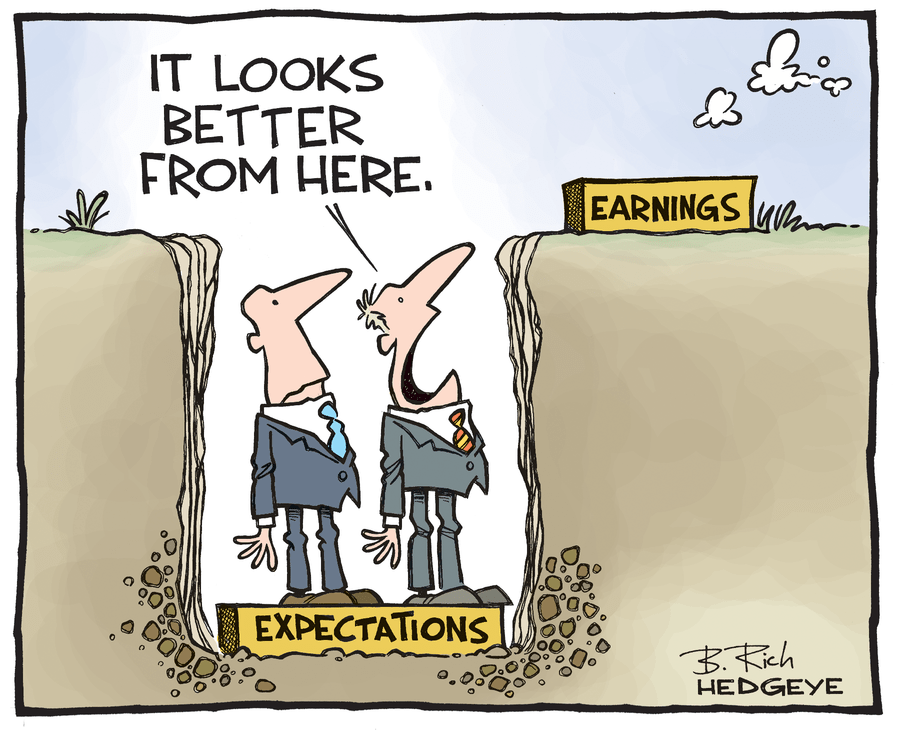Key Themes from the February Reporting Season
The February 2021 company reporting season that concluded on Friday and was one of the more interesting over the past decade, coming as it does after the doom and gloom of the February and August 2020 results seasons. Aside from a few companies such as JB Hi-Fi and Sonic Healthcare that were forced by ASIC and the ASX’s continuous disclosure laws to give market updates (due to unprecedented demand for electrical goods and COVID-19 tests), most companies had given the market very little profit guidance going into the February season.
In this piece we are going to look at the key themes coming out of the reporting season that finished on Friday.

Better than expected
Given the gloomy backdrop of 2020, ongoing uncertainty around COVID-19 and further lockdowns in late 2020, general expectations were cautious going into reporting season. The market expected little in the way of positive sentiment from management teams outside the COVID-19 winners and the miners.
February 2020 has generally seen companies outperform expectations on revenue, earnings and dividends. Earnings upgrades came from banks (with fewer bad debts) and resources (higher commodity prices). Dividends were the highlight of the reporting season with many companies increasing payouts to shareholders, potentially in recognition that dividends were cut too hard in 2020.
On the negative side of the ledger the rising Australian dollar hurt the translation of profits earned by companies in US dollars such as CSL, Macquarie Bank, BHP and Sonic Healthcare.
Show me the money
During times of uncertainty such as those seen in 2020, the first move a company’s board will make is to either cut or reduce dividends paid to shareholders with the aim of conserving cash. This move is preferable both to a dramatic reduction of their workforce – which crystalises significant redundancy costs – and to raising equity, which dilutes that of current shareholders.
2020 saw significant dividend cuts from most ASX listed companies. However, the main feature of the February reporting season has been companies significantly increasing dividends or resuming dividend payments that were previously suspended.
We see that dividends are a better measure of management’s and the board’s opinions of a company’s health: a company is unlikely to raise dividends if business conditions are worsening. Furthermore, while earnings per share can be restated at a later day due to “accounting opinions,” once dividends are paid, they cannot be retrieved.
Commonwealth Bank’s result is always one of the most closely scrutinised – not only because it is Australia’s largest company, but with 15 million customers, the health of CBA often mirrors the health of Australia. With this in mind it was pleasing to see CBA lift its dividend from $0.98 to $1.50 per share.
Covid-19 Stars Fading
One of the more interesting results has been Coles that was off significantly post the result, despite reporting a 14.5% gain in profits. The fall in Coles’ share price was mainly due to management’s warning about sales growth of only +3% in January. They indicated that investors should expect a sales decline in the second half of 2021, as Coles’ future earnings will not compare favourably to those from last year, which benefited from panic buying behaviour exhibited prior to lockdowns.
Coles’ result sent a tremor through the retail sector. The impact was felt even in companies such as JB Hi-Fi who reported a very impressive 86% growth in profit for the half, and saw strong sales momentum continue into January. Conversely, we have seen a recovery in some of the losers from COVID-19 based on signs that the worst may be behind them: for example, Tabcorp, Sydney Airport and IDP education.
Government Handouts
Cash flows from the government have been a significant feature of the February results season, both directly via JobKeeper payments and indirectly due to the impact that these payments have had on consumers ability to pay for goods and services. Obviously, the direct payments are more tangible. Understandably, however, the impact was not highlighted by management when they presented their results, given the increasing community backlash against the payment.
Harvey Norman’s result attracted a large amount of commentary in the press after reporting a record profit on the back of strong online sales, maximising JobKeeper subsidies, and rent waivers. However, many other companies have also benefited from stimulus plans without receiving the same level attention.
Over the past month Crown, Sydney Airport, Qantas, Vicinity and Aristocrat all received employment support measures. Amusingly one company proudly announced that they had not accepted a single dollar of JobKeeper payments, while simultaneously revealing a 27% increase in profits. We are not sure how this company could have been eligible for this support program. In February Domino’s Pizza, Nick Scali, CIMIC and Cochlear all announced that they would repay previously received JobKeeper subsidies
Best and Worst
Over the month, the best results were delivered by JB Hi-Fi, Nine Entertainment, Bendigo Bank, Amcor and CSL. Each of these companies reported strong earnings growth against the gloomy macroeconomic background.
On the negative side of the ledger, it is harder to find candidates as low expectations create an easy hurdle for most companies to jump over. AMP, Challenger and Crown, however, all delivered results below expectations. The common themes amongst this group were the profit results coming in below expectations, combined with bearish management commentary for the coming year, mainly due to the inability to reduce costs in line with revenue falls.
While Treasury Wine’s share price has rallied in February, it is hard to make the case that this maker of high-quality wines has turned the corner. Treasury’s profits were down -24% as the impacts of punitive Chinese tariffs (> 200%) begin to bite on sales of Penfolds, a mainstay of banquets from Harbin to Chengdu. China was previously a large, growing and profitable market for Treasury and accounted for over 40% of company profits in FY19. Such a market is not easily replaced, and the loss is due to no fault of company management.
Result of the Season
While some companies have done well out of the COVID-19 pandemic, it is difficult to think of a company that has flourished well as global pathology testing company Sonic Healthcare. In the outstanding result of the reporting season, Sonic demonstrated one of the reasons why we like the company: pathology is a volume game, laboratories have high fixed costs, but as much higher volumes flow through the same lab, profit margins increase. Profits were up a staggering +166% with 18 million COVID-19 tests performed across 60 global labs. While volumes have been falling in Australia, they are still at record levels in Europe and the USA. The next leg in this pandemic story for Sonic is likely to be COVID-19 serology testing (immunity status). Since I started covering stocks as a young analyst in the late 1990s, I have never seen a result like this from a large cap stock.
Our take
Overall, we were reasonably pleased with the results from this reporting season for the Core Australian Equity Portfolio. As the Atlas High Income Property Fund focuses on owning conservative Trusts that are rent collectors, reporting season offers few surprises – especially as most of the Trusts we own pre-announced the distributions several months ago in December.
As a long-term investor interested in delivering income in the portfolio to investors, something we look at closely is the dividends paid out by the companies that we own and whether or not they are growing. We look to “weigh” the dividends that our investors will receive, as our view is that talk and guidance from management are often cheap, but actually paying out higher dividends is a far better indicator that a business is performing well. Using a weighted average, the dividends that our investors will receive will be +30% greater than for the previous six months, demonstrating confidence returning to Australian corporates after the uncertainty brought on by the pandemic. On this measure, we are fairly satisfied with how the recent reporting season went.
1 topic
4 stocks mentioned

